Brief
Feb 07 2017
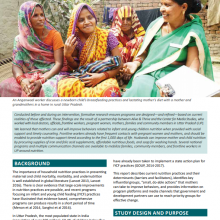
Nutrition practices in Uttar Pradesh (UP): Results from a formative research study
Alive & Thrive conducted formative research to better understand the nutrition practices in Uttar Pradesh. We found that mothers can and will improve behaviors related to infant and young children nutrition when provided with social support and timely counseling.
Brief
Feb 07 2017
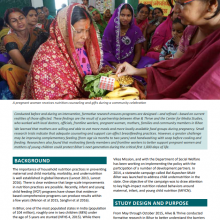
Nutrition practices in Bihar: Results of a formative research study
Alive & Thrive conducted formative research to better understand the nutrition practices in Bihar. We learned that mothers are willing and able to eat more meals and more locally available food groups during pregnancy. Read our formative research brief to learn about other findings.
Brief
Feb 02 2017
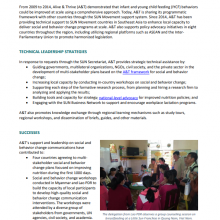
Briefing note: SUN technical assistance in Southeast Asia
In Southeast Asia, A&T shares its programmatic framework with other countries through the SUN Movement support system.
Journal article
Sep 01 2016

Changes in knowledge, attitude and involvement of fathers in supporting exclusive breastfeeding: A community-based intervention study in a rural area of Viet Nam (Bich TH., 2016. International Journal of Public Health)
A one-year intervention in Viet Nam sought to understand how fathers’ knowledge, attitudes, and involvement in supporting exclusive breastfeeding (EBF) might change after receiving breastfeeding education materials and counseling services.
Report
Apr 30 2016
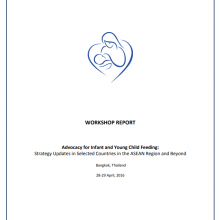
Advocacy for infant and young child feeding: Strategy updates in selected countries in the ASEAN region and beyond
Strategic and well-coordinated advocacy is essential to improve nutrition at scale. Recent efforts in countries throughout Southeast Asia have generated regional momentum and resulted in stronger nutrition policies and programs.
Brief
Apr 26 2016
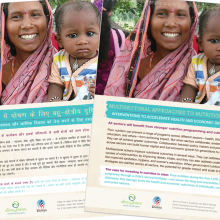
Multisectoral approaches to nutrition in Bihar, India
Multisectoral actions improve nutritional outcomes in several ways. They can address the immediate causes of undernutrition by improving dietary intake, and they can also address underlying causes like improved sanitation, hygiene, and women’s education.

